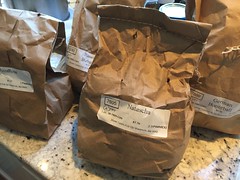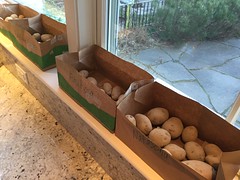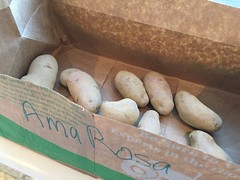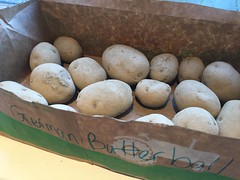



Potatoes are hardy enough to be planted outside now. One reason I'm sprouting them inside is I haven't prepared my potato beds yet. It's been chilly and I've been busy. But I have been researching how to prepare the beds. (They're at my community garden.) I looked up whether potatoes like a fertile soil and I found all sorts of different answers: some site say they're light feeders, others say heavy feeders! OK, so a Google advanced search of only .edu sites, voila!, they are heavy feeders. All the extension sites agree.
I didn't realize potatoes are heavy feeders and so I haven't given them much compost in the past. This year I want to put on a good 2 inches of compost. That means I'll need 1 cubic yd (27 cu ft). Compost is so expensive, especially when purchased by the bag. I think I'll bring compost from my home bins to my community garden. I've generated a lot of compost in the past year and I figure the effort to transport it is similar to transporting bags of compost. So that's on my to-do list next week.
At my Master Gardener class today, the speaker talked about SOIL. A great topic! The head of the soil testing lab at the Univ of Conn (Dawn Pettinelli) gave a super 5 hour soil course. She told us that pH is the most important parameter to keep track of in garden soils (drainage too). She mentioned that potato scab is one of the plant diseases affected by soil pH. (I hate digging up potatoes and finding them covered in scab.) She said that at a pH lower than 5.2, the scab pathogen won't grow (the potatoes will), so this is one approach to prevent scab. But if you lower the pH in your potato bed, it makes it hard to rotate plantings. So she said - grow resistant varieties. OK, I did select for scab resistance in the varieties I have this year. Hopefully I'll have scab-free potaotes this year.
Tidak ada komentar:
Posting Komentar